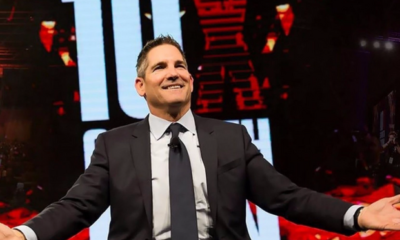Success Advice
7 Habits of Highly Effective Mediocre People

The following article is by a highly interesting author by the name of James Altucher, who outlines the 7 Habits of Highly Effective Mediocre People. With a plethora of great points and amazing lessons to learn, read on my friends and you’ll see why it may not be so bad after all to consider yourself as “Mediocre“.
The following is an excerpt from Choose Yourself: Be Happy, Make Millions, Live the Dream by James Altucher, founder of StockPickr, and writer for TechCrunch, HuffPo, and Forbes.
7 Habits of Highly Effective Mediocre People
I’m pretty mediocre. I’m not even being sarcastic or self-deprecating. I’ve never done anything that stands out as, “Woah! This guy made it into outer space! Or…this guy has a bestselling novel! Or…if only Google had thought of this!” I’ve had some successes and some failures but never reached any of the goals I had initially set. Always slipped off along the way, off the yellow brick road, into the wilderness.
I’ve started a bunch of companies. Sold some. Failed at most. I’ve invested in a bunch of startups. Sold some. Failed at some, and the jury is still sequestered on a few others. I’ve written some books, most of which I no longer like. I can tell you overall, though, everything I have done has been distinguished by its mediocrity, its lack of a grand vision, and any success I’ve had can be just as much put in the luck basket as the effort basket.
That said, all people should be so lucky. We can’t all be grand visionaries. We can’t all be Picassos. We want to make our business, make our art, sell it, make some money, raise a family, and try to be happy. My feeling, based on my own experience, is that aiming for grandiosity is the fastest route to failure. For every Mark Zuckerberg there are 1000 Jack Zuckermans. Who is Jack Zuckerman? I have no idea. That’s my point. If you are Jack Zuckerman and are reading this, I apologize. You aimed for the stars and missed. Your re-entry into the atmosphere involved a broken heat shield and you burned to a crisp by the time you hit the ocean. Now we have no idea who you are.
If you want to get rich, sell your company, have time for your hobbies, raise a halfway decent family, and enjoy the sunset with your wife on occasion, here are some of my highly effective recommendations.
1 – Procrastination
Procrastination is your body telling you you need to back off a bit and think more about what you are doing. When you procrastinate as an entrepreneur it could mean that you need a bit more time to think about what you are pitching a client. It could also mean you are doing work that is not your forte and that you are better off delegating. I find that many entrepreneurs are trying to do everything when it would be cheaper and more time-efficient to delegate, even if there are up front monetary costs associated with that. In my first business, it was like a lightbulb went off in my head the first time I delegated a programming job to someone other than me. Why did I decide finally to delegate then at that particular point? I had a hot date. Which was infinitely better than me sweating all night on some stupid programming bug.
Try to figure out why you are procrastinating. Maybe you need to brainstorm more to improve an idea. Maybe the idea is no good as is. Maybe you need to delegate. Maybe you need to learn more. Maybe you don’t enjoy what you are doing. Maybe you don’t like the client whose project you were just working on. Maybe you need to take a break. There’s only so many seconds in a row you can think about something before you need to take time off and rejuvenate the creative muscles. This is not for everyone. Great people can storm right through. Steve Jobs never needed to take a break. But I do.
Procrastination could also be a strong sign that you are a perfectionist. That you are filled with shame issues. This will block you from building and selling your business. Examine your procrastination from every side. It’s your body trying to tell you something. Listen to it.
2 – Zero-tasking
There’s a common myth that great people can multi-task efficiently. This might be true but I can’t do it. I have statistical proof. I have a serious addiction. If you ever talk on the phone with me there’s almost a 100% chance I am simultaneously playing chess online. The phone rings and one hand reaches for the phone and the other hand reaches for the computer to initiate a one minute game. Chess rankings are based on a statistically generated rating system. So I can compare easily how well I do when I’m on the phone compared with when I’m not on the phone. There is a three standard deviation difference. Imagine if I were talking on the phone and driving. It’s the same thing I’m assuming: phone calls cause a three standard deviation subtraction in intelligence. And that’s the basic multi-tasking we all do at some point or other.
So great people can multi-task. But since, by definition, most of us are not great , it’s much better to single-task. Just do one thing at a time.
Often, the successful mediocre entrepreneur should strive for excellence in ZERO-tasking. Do nothing. We always feel like we have to be “doing something” or we feel ashamed. Sometimes it’s better to just be quiet, to not think of anything at all. A very successful, self-made businessman once told me, “Never underestimate the power of a long, protracted silence.”
3 – Failure
As far as I can tell, Larry Page has never failed. He went straight from graduate school to billions. Ditto for Mark Zuckerberg, Bill Gates, and a few others. But again, by definition, most of us are pretty mediocre. We can strive for greatness but we will never hit it. That means we will often fail. Not ALWAYS fail. But often.
My last 16 out of 17 business attempts were failures. Ultimately, life is a sentence of failures, punctuated only by the briefest of successes. So the mediocre entrepreneur learns two things from failure: First, he learns directly how to overcome that particular failure. He’s highly motivated to not repeat the same mistakes. Second, he learns how to deal with the psychology of failure. Mediocre entrepreneurs fail A LOT. So they get this incredible skill of getting really good at dealing with failure. This translates to monetary success.
The mediocre entrepreneur understands that persistence is not the self-help cliché “Keep going until you hit the finish line!” It’s, “Keep failing until you accidentally no longer fail.” That’s persistence.
4 – Not Original
I’ve never come up with an original idea in my life. My first successful business was making web software, strategies, and websites for Fortune 500 companies. Not an original idea but at the time, in the 90s, people were paying exorbitant multiples for such businesses. My successful investments all involved situations where I made sure the CEOs and other investors were smarter than me. 100% of my zeros as an angel investor were situations where I thought I was smart. I wasn’t. I’m mediocre.
The best ideas are when you take two older ideas that have nothing to do with each other, make them have sex with each other, and then build a business around the bastard, ugly child that results. Look at Facebook: combine the internet with stalking. Amazing!
And, by the way, it was about the fifth attempt at such a social network. Twitter, combine internet with antiquated SMS protocols. Ugly! But it works. Ebay, combine ecommerce with auctions. If Justin Bieber sang John Lennon’s “Imagine” it would be a huge hit. I might even listen to it.
5 – Poor Networking
I’m that guy. You know the one at the party that doesn’t talk to anyone and stands in the corner. I usually say no to very nice networking dinner invitations. I like to stay home and read. When I was running businesses I was often too shy to talk to my employees. I would call my secretary from downstairs and ask if the hallway was clear, then ask her to unlock my door and I’d hurry upstairs and lock the door behind me. That particular company failed disastrously.
But many people network too much. Entrepreneurship is hard enough. It’s 20 hours a day of managing employees, customers, meetings, and product development. And then what are you going to do? Network all night? Save that for the great entrepreneurs. Or the ones who are about to fail. The mediocre entrepreneur works his 20 hours, then relaxes when he can. It’s tough to make money.
6 – Do Anything To Get A “Yes.”
Here’s a negotiation I did. I was starting stockpickr.com and meeting with the CEO of thestreet.com. He wanted his company to have a percentage of stockpickr.com and in exchange he would fill up all of our ad inventory. I was excited to do the deal. I said, “Ok, I was thinking you would get 10% of the company.” He laughed and said, “No. 50%”. He didn’t even say “We would like 50%”. He just said, “50%”. I then used all my negotiating skills and came up with a reply. “Okay. Deal.”
I’m a salesman. I like people to say yes to me. When I started a company doing websites we were pitching to do “miramax.com”. I said, “$50,000″. They said, “No more than $1,000 and that’s a stretch.” I used my usual technique: “Deal!”
But the end results: in one case thestreet.com had a significant financial stake so that gave them more psychological stake. And for my first business, Miramax was now on my client list. That’s why Con Edison had to pay a lot more. Often, the secret poor negotiators keep is that we get more deals done. I get the occasional loss leader, and then ultimately the big fish gets reeled in if I get enough people to say “yes”. It’s like asking every girl on the street to have sex with you. One out of 100 will say “yes”. In my case it might be one out of a million but you get the idea.
7 – Poor Judge of People
The mediocre entrepreneur doesn’t “Blink” in the Malcolm Gladwell sense. In Gladwell’s book he often talks about people who can form snap correct judgments in two or three seconds. My initial judgment when I meet or even see people is this: I hate you.
And then I veer from that to too trusting. Finally, after I bounce back and forth, and through much trial and error, I end up somewhere in the middle. I also tend to drop people I can’t trust very quickly. I think the great entrepreneur can make snap judgments and be very successful with it. But that doesn’t work for most people.
At this point, when I meet someone, I make sure I specifically don’t trust my first instincts. I get to know people more. I get to understand what their motivations are. I try to sympathize with whatever their position is. I try not to argue or gossip about them before I know anything. I have to do this because I’m mediocre and I’m a lot more at risk of bringing the wrong people into my circle.
So by the time I’ve decided to be close to someone–a client, an employee, an acquirer, an acquiree, a wife, etc–I’ve already done a lot of the thinking about them. This means I can’t waste time thinking about other things, like how to put a rocket ship on Jupiter. But overall it’s worked.
“I thought being mediocre is supposed to be bad?” one might think. Shouldn’t we strive for greatness? And the answer is: “Of course we should! But let’s not forget that 9 out of 10 motorists think they are ‘above average drivers.’” People overestimate themselves. Don’t let overestimation get in the way of becoming fabulously rich, or at least successful enough that you can have your freedom, feed your family, and enjoy other things in life.
Final Words
Being mediocre doesn’t mean you won’t change the world. It means being honest with yourself and the people around you. And being honest at every level is really the most effective habit of all if you want to have massive success.
Feature Image Courtesy of NBC
Success Advice
How to Choose the Best Affiliate Programs for Your Blog
If you follow these steps, you can create an affiliate marketing plan that makes money, fits well with your content, and connects with your readers

Picking the right affiliate programs for your blog is really important. It can make a big difference in how much money you can make and how much your readers get out of your blog. With so many choices out there, deciding which ones to go with can be tricky.
This guide is here to make it easier for you. It will give you clear steps and helpful tips to choose affiliate programs that fit well with what your blog is about, what your readers like, and what you stand for.
For more articles on this theme, please head over to this blog https://blog.partners1xbet.com/.
Understanding Affiliate Marketing
Before you start picking affiliate programs, it’s important to really understand what affiliate marketing is and how it works.
Basically, affiliate marketing is when you promote a product or service on your blog, and then you get paid a little bit every time someone buys something or does something because you recommended it.
It’s great for both the person selling the product and the blogger, because the seller gets more sales with low risk, and the blogger can make money from their blog.
How to Choose the Right Affiliate Programs for Your Blog
1. Assess Your Niche and Audience
The key to doing well in affiliate marketing starts with really knowing what your blog is about and who reads it. Consider the following:
- Your blog’s content: What topics do you cover? Ensure the products or services you promote are relevant.
- Your audience’s interests and needs: What solutions are they seeking? Choose affiliate programs that offer products or services that solve their problems or enhance their lives.
2. Research Potential Affiliate Programs
Once you know what your blog is about and what your readers want, start looking for affiliate programs. Choose ones that are well-known for good products, great customer service, and helpful support for affiliates. Resources to find these programs include:
- Affiliate networks like ShareASale, Commission Junction, and ClickBank.
- Direct searches for “[Your Niche] affiliate programs” in search engines.
- Recommendations from other bloggers in your niche.
3. Evaluate the Commission Structure
The commission structure is a critical factor to consider. Look for programs that offer competitive rates that make your efforts worthwhile. Consider:
- The percentage of commission per sale.
- Whether the program offers a flat rate per action (e.g., per sign-up).
- The cookie duration, which affects how long after a click you can earn commissions on sales.
4. Consider the Program’s Reputation and Sureness
Join affiliate programs with a solid reputation for quality and sureness. This not only ensures that you’re promoting good products but also that you’ll be paid on time. You can:
- Read reviews from other affiliates.
- Check the program’s history and background.
- Look for any complaints or issues reported online.
5. Analyze the Support and Resources Offered
A good affiliate program gives you things like ads to use, training on their products, and helpful managers. Having access to these resources can really help you do a better job at promoting their products.
6. Understand the Terms and Conditions
Before signing up, thoroughly review the program’s terms and conditions. Pay close attention to:
- Payment thresholds and methods.
- Any restrictions on how you can promote their products.
- The program’s policy on affiliate marketing on social media platforms.
7. Test the Product or Service
If possible, test the product or service before promoting it. This firsthand experience allows you to offer genuine charge and build trust with your audience.
8. Look for Recurring Commission Opportunities
Some affiliate programs pay you again and again for subscriptions or services that charge fees regularly. These can provide a more stable income compared to one-time sales commissions.
Implementing Your Choice
After choosing the best affiliate programs, the next step is to smoothly include your affiliate marketing in your content plan. This includes:
- Creating valuable content that naturally incorporates affiliate links.
- Disclosing your affiliate affairs transparently to maintain trust with your audience.
- Tracking your results to understand what works best for your audience and adjusting your strategy accordingly.
Picking the best affiliate programs for your blog involves careful planning, research, and making sure they match what your audience likes and needs.
If you follow these steps, you can create an affiliate marketing plan that makes money, fits well with your content, and connects with your readers.
The real key to doing well with affiliate marketing isn’t just about the products you talk about, but also how much your audience trusts and values your advice.
With enough time, patience, and hard work, your blog can grow into a successful space that earns a good amount of affiliate money and helps your readers choose the right products.
Success Advice
The Power of Ethical Leadership: How Integrity Drives Success
By leading with integrity and ethics, leaders create an environment where employees feel excited to come to work

What differentiates a positive organizational culture that enjoys a clean reputation and long-term success from a toxic culture drowning in scandals, mistrust, and legal fines? (more…)
Success Advice
10 Landing Page Hacks Experts Are Using to Generate Leads
Crafting a landing page that converts is both an art and a science

If you are in the online marketing world, you know the importance of a high-quality landing page. It’s like a secret sauce that can turn a casual user into a solid lead. I will walk you through ten great tips that have worked wonders for me and could do the same for you in creating landing pages that generate leads. (more…)
Success Advice
An Easy to Follow 8 Step Strategy for Creative Problem Solving
A complete process of creative problem-solving encompasses finding problems, developing creative solutions, and implementing your solutions

No matter where you look around the world today, entrepreneurs face a common challenge: The need to stand out from their competitors and win over customers. (more…)
-

 Life4 weeks ago
Life4 weeks agoThe Best Techniques to Boosting Your Memory in a Busy World
-

 Success Advice4 weeks ago
Success Advice4 weeks agoAn Easy to Follow 8 Step Strategy for Creative Problem Solving
-

 Entrepreneurs4 weeks ago
Entrepreneurs4 weeks agoCrisis-Proof Your Business Now: Essential Strategies for Every Entrepreneur
-

 Success Advice3 weeks ago
Success Advice3 weeks ago10 Landing Page Hacks Experts Are Using to Generate Leads
-

 Entrepreneurs2 weeks ago
Entrepreneurs2 weeks agoThe Mindset Shifts Required to Become a Successful Online Entrepreneur
-

 Success Advice2 weeks ago
Success Advice2 weeks agoThe Power of Ethical Leadership: How Integrity Drives Success
-

 Entrepreneurs2 weeks ago
Entrepreneurs2 weeks ago6 Hacks to Boost Your Productivity as a Business Owner
-

 Success Advice1 week ago
Success Advice1 week agoHow to Choose the Best Affiliate Programs for Your Blog






























10 Comments